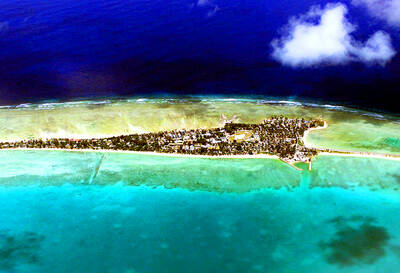It is often said that Ukraine lies on a fault line between East and West. But from Moscow’s point of view, even that simple analysis is threatening. It indicates how far the front has move eastward since the end of the Cold War. But that momentum has run out. Moscow has become progressively more assertive and Western security concerns are focused elsewhere.
Ukraine’s presidential election looks certain to reflect that change in the strategic weather, with opinion polls favoring candidates ready to do business with Russia.
Divisions inside the country have always reflected competing pressures from outside. Seen from Washington, the collapse of communism opened up a “New Europe”, with two functions. First, former Soviet satellites under NATO protection would be a buffer against any resurgence of a hostile Russia. Second, these new potential NATO members would be more willing clients in other respects — opening their markets and supporting US foreign policy in general.
But Russia does not have a rival strategic claim so much as a different concept of what Ukraine is. Many Russians see it as an inseparable part of a greater Slavic entity whose capital is Moscow.
That view, or a diluted version of it, is shared also by Ukrainians in the east of the country, who consider themselves Russian or who have Russian as their main language. By contrast, Ukrainian nationalism in its most anti-Russian form is concentrated in western parts of the country that have stronger ties to Poland. In the middle, geographically and politically, is ambivalence and nervous pragmatism. Western support is welcome, but it can come and go: Russia is a permanent fixture on the doorstep.
That fact is reinforced whenever Moscow cuts off gas supplies. Ukraine is a vital transit point to EU markets, something that augments its strategic importance but also creates opportunities for corruption.
To make matters more complicated, Russia’s Black Sea fleet is based in Crimea — territory that Moscow only grudgingly accepts as part of Ukraine.
Moscow sees any Ukrainian bid for NATO membership as a threat. It saw the 2004 “Orange Revolution” as proof of Western meddling in its “sphere of influence.”
But there is no single “Western” aspiration for Ukraine. The EU is divided and the US’ view is mutable. Russia’s vicious little war with Georgia in 2008 had various causes, but one result was to signal an end to Moscow’s patience with any Western involvement in its backyard.
That fact, combined with an increased US focus on securing Russian diplomatic support against Iran, means further NATO enlargement is being discreetly shelved. Many Ukrainians see that as appeasement of an authoritarian Moscow. Others see it as sensible realpolitik.
Either way, Ukraine’s constant misfortune is to have the big decisions about its future taken in foreign capitals. That, more than anything, explains why politics in Kiev is so perennially unstable and dysfunctional.

DISASTER: The Bangladesh Meteorological Department recorded a magnitude 5.7 and tremors reached as far as Kolkata, India, more than 300km away from the epicenter A powerful earthquake struck Bangladesh yesterday outside the crowded capital, Dhaka, killing at least five people and injuring about a hundred, the government said. The magnitude 5.5 quake struck at 10:38am near Narsingdi, Bangladesh, about 33km from Dhaka, the US Geological Survey (USGS) said. The earthquake sparked fear and chaos with many in the Muslim-majority nation of 170 million people at home on their day off. AFP reporters in Dhaka said they saw people weeping in the streets while others appeared shocked. Bangladesh Interim Leader Muhammad Yunus expressed his “deep shock and sorrow over the news of casualties in various districts.” At least five people,

ON THE LAM: The Brazilian Supreme Court said that the former president tried to burn his ankle monitor off as part of an attempt to orchestrate his escape from Brazil Former Brazilian president Jair Bolsonaro — under house arrest while he appeals a conviction for a foiled coup attempt — was taken into custody on Saturday after the Brazilian Supreme Court deemed him a high flight risk. The court said the far-right firebrand — who was sentenced to 27 years in prison over a scheme to stop Brazilian President Luiz Inacio Lula da Silva from taking office after the 2022 elections — had attempted to disable his ankle monitor to flee. Supreme Court judge Alexandre de Moraes said Bolsonaro’s detention was a preventive measure as final appeals play out. In a video made

It is one of the world’s most famous unsolved codes whose answer could sell for a fortune — but two US friends say they have already found the secret hidden by Kryptos. The S-shaped copper sculpture has baffled cryptography enthusiasts since its 1990 installation on the grounds of the CIA headquarters in Virginia, with three of its four messages deciphered so far. Yet K4, the final passage, has kept codebreakers scratching their heads. Sculptor Jim Sanborn, 80, has been so overwhelmed by guesses that he started charging US$50 for each response. Sanborn in August announced he would auction the 97-character solution to K4

SHOW OF FORCE: The US has held nine multilateral drills near Guam in the past four months, which Australia said was important to deter coercion in the region Five Chinese research vessels, including ships used for space and missile tracking and underwater mapping, were active in the northwest Pacific last month, as the US stepped up military exercises, data compiled by a Guam-based group shows. Rapid militarization in the northern Pacific gets insufficient attention, the Pacific Center for Island Security said, adding that it makes island populations a potential target in any great-power conflict. “If you look at the number of US and bilateral and multilateral exercises, there is a lot of activity,” Leland Bettis, the director of the group that seeks to flag regional security risks, said in an